This article was originally published in The Notebook. In August 2020, The Notebook became Chalkbeat Philadelphia.
Part One of a three-part series
Part Two |
Maureen Brower faced a choice.
It was March 2014. She’d been teaching at Blaine Elementary School in North Philadelphia’s Strawberry Mansion neighborhood for five years.
For the first couple of years, she thought she could see her students’ lives improving as a direct result of her work. Then she began to notice that children she had taught just a few years earlier seemed to be adrift. That’s when the doubts first started coming.
“It would make me upset, because I felt like all the work that I had done was now undone, and I didn’t know how to fix it,” she said. “And I wanted to fix it.”
Brower often took her frustrations home, venting them to her husband, sometimes in tears.
A kindergarten teacher assists her students. Photo by WHYY
Kindergarten teacher Maureen Brower keeps students on task in her classroom at Blaine Elementary School. (Emma Lee/WHYY) Part of the problem, Brower thought, came from a lack of cohesion among the faculty.
“In previous years, we haven’t always had 100 percent of teachers following through. They were just kind of set in their ways of just doing the same thing over and over again.”
The school’s principal, Gianeen Powell, had become increasingly frustrated with this as well.
“You just have to have the right people on board who want to do the same type of work – not come in at a certain time and leave at a certain time,” she said. “This is hard work, and hard work takes a lot of time outside of the school day.”
Late in the 2013-14 school year, Powell began pushing to make a big change.
With the School District’s consent and the help of a private, philanthropic grant, Blaine Elementary had been working on a plan to reimagine the school. Through that process, Powell hoped to exercise a clause in the teachers’ contract that allows half of a school’s faculty to be pushed out for a school turnaround effort.
But she didn’t want to do it unless there was support among the school’s teacher leaders, including Brower.
Brower and the leadership team mulled it over.
Eventually, they voted yes and then helped Powell interview new applicants for their former colleagues’ jobs.
“Seeing my most successful students not be so successful anymore, that made me want to make a change, need to make a change for the kids and community to become better,” said Brower.
That vote happened in March 2014, and soon after, all teachers had to reapply for their jobs.
The teachers’ union cried foul, and some of the faculty complained of being left in the dark.
This was principal Powell in April 2014:
“I did sit-down one-on-ones with each one of the teachers, and they were able to say if they wanted to be here. Some of them said, ‘No, this is a great opportunity for me to take my years and go to another school.’”
A new slate of teachers was hired, with the promise that the shakeup would vastly improve student achievement.
Since then, for more than a year, NewsWorks has tracked Blaine’s attempt at transformation through dozens of interviews with parents, students, teachers, and staff and found that the stakes for this work are immense.
The hopes and dreams of children, parents, and grandparents hang in the balance. Educators devote themselves wholly to the cause, often sacrificing their personal lives.
And at bottom lies a question of utmost importance to the city of Philadelphia: Amid a budget crisis, can the School District revitalize a school in one of the city’s most poverty-stricken neighborhoods?
‘That’s the neighborhood’
A school like Blaine, does not – cannot – simply teach reading, writing, math and science. Situated in the heart of Strawberry Mansion, the K-8 school absorbs the problems that plague the surrounding community.
Blaine parent Roslinda Harris knows the issues as well as anybody.
During the day, the thunder of motorbikes roars through Harris’ narrow row home. At night, gunshots aren’t a surprise.
“It never fails. If you look at the statistics of the neighborhood and you were a teacher or a staff member in that school, you wake up, you listening to that everyday, you’re about to come to a war zone,” she said.


